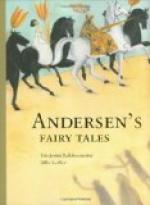He perceived immediately a quantity of beings who were certainly what we call “men”; yet they looked different to us. A far more correct imagination than that of the pseudo-Herschel* had created them; and if they had been placed in rank and file, and copied by some skilful painter’s hand, one would, without doubt, have exclaimed involuntarily, “What a beautiful arabesque!”
This relates to a book published some years ago in Germany, and said to be by Herschel, which contained a description of the moon and its inhabitants, written with such a semblance of truth that many were deceived by the imposture.
Probably a translation of the celebrated Moon hoax, written by Richard A. Locke, and originally published in New York.
They had a language too; but surely nobody can expect that the soul of the watchman should understand it. Be that as it may, it did comprehend it; for in our souls there germinate far greater powers than we poor mortals, despite all our cleverness, have any notion of. Does she not show us—she the queen in the land of enchantment—her astounding dramatic talent in all our dreams? There every acquaintance appears and speaks upon the stage, so entirely in character, and with the same tone of voice, that none of us, when awake, were able to imitate it. How well can she recall persons to our mind, of whom we have not thought for years; when suddenly they step forth “every inch a man,” resembling the real personages, even to the finest features, and become the heroes or heroines of our world of dreams. In reality, such remembrances are rather unpleasant: every sin, every evil thought, may, like a clock with alarm or chimes, be repeated at pleasure; then the question is if we can trust ourselves to give an account of every unbecoming word in our heart and on our lips.
The watchman’s spirit understood the language of the inhabitants of the moon pretty well. The Selenites* disputed variously about our earth, and expressed their doubts if it could be inhabited: the air, they said, must certainly be too dense to allow any rational dweller in the moon the necessary free respiration. They considered the moon alone to be inhabited: they imagined it was the real heart of the universe or planetary system, on which the genuine Cosmopolites, or citizens of the world, dwelt. What strange things men—no, what strange things Selenites sometimes take into their heads!
* Dwellers in the moon.
About politics they had a good deal to say. But little Denmark must take care what it is about, and not run counter to the moon; that great realm, that might in an ill-humor bestir itself, and dash down a hail-storm in our faces, or force the Baltic to overflow the sides of its gigantic basin.
We will, therefore, not listen to what was spoken, and on no condition run in the possibility of telling tales out of school; but we will rather proceed, like good quiet citizens, to East Street, and observe what happened meanwhile to the body of the watchman.




